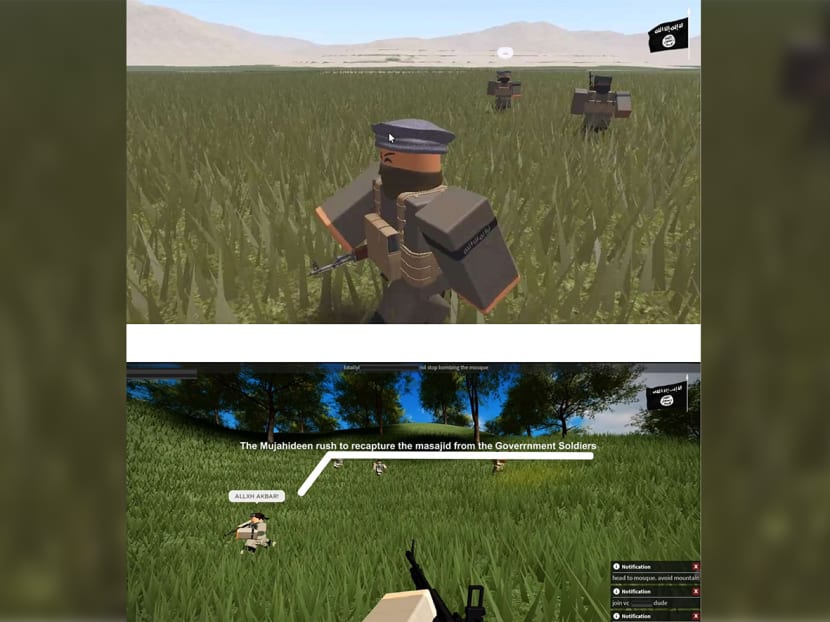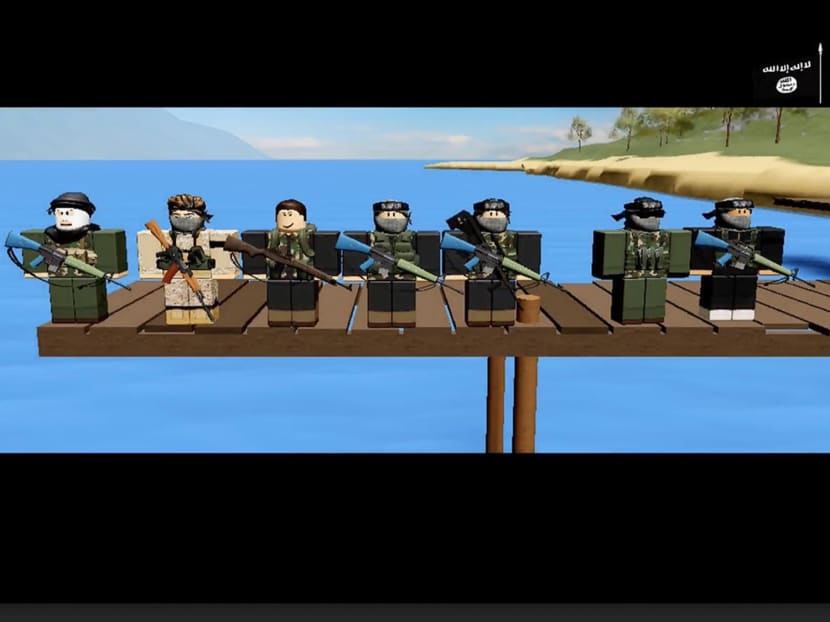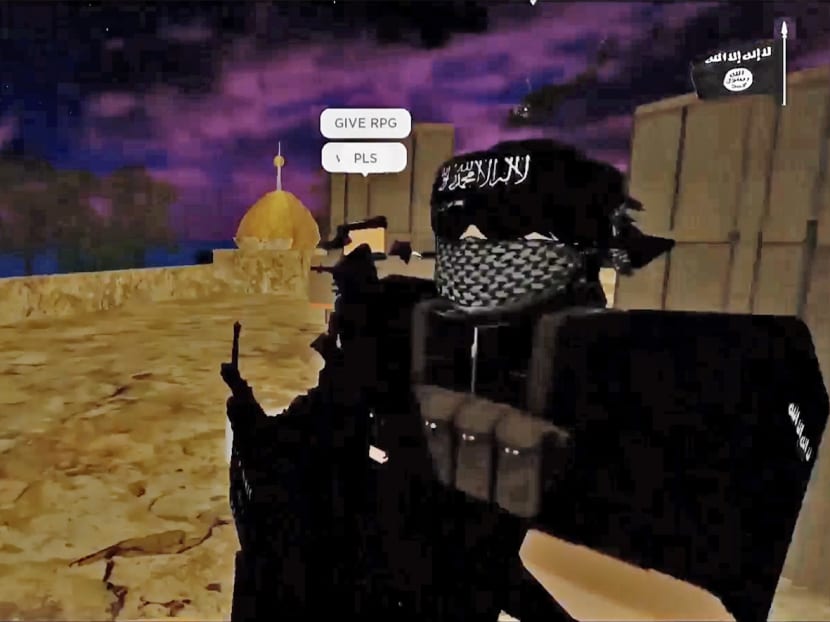2 teens dealt with under ISA: Boy, 15, is youngest detainee to date, another 16-year-old radicalised through gaming platform
SINGAPORE — A 15-year-old self-radicalised Secondary 3 student, who had considered conducting knife attacks to behead non-Muslims in popular tourist areas in Singapore, has been detained last December under the Internal Security Act (ISA), making him the youngest person dealt with under the law for terrorism-related activities to date.

A screenshot of an Islamic State of Iraq and Syria propaganda video created by a 16-year-old radicalised youth using the Roblox online gaming platform.
- When he was arrested, a 15-year-old boy was deeply entrenched in his radical views but had not undertaken any steps in carrying out terror attacks
- Another self-radicalised teenager, 16, was caught in January taking in Isis propaganda and engaging in Isis-related discussions on various online platforms
- He has been issued a Restriction Order
- The pair were online contacts of an 18-year-old who was detained under the ISA in December 2022
- Since 2015, ISD has dealt with 11 self-radicalised Singaporean youth aged 20 and below under the ISA and all were radicalised online
SINGAPORE — A 15-year-old self-radicalised Secondary 3 student, who had considered conducting knife attacks to behead non-Muslims in popular tourist areas in Singapore, has been detained last December under the Internal Security Act (ISA), making him the youngest person dealt with under the law for terrorism-related activities to date.
Inspired by beheading and suicide bombing videos of the terrorist group Islamic State of Iraq and Syria (Isis) that he frequently viewed online, the teenager also thought about being a suicide bomber and fantasised about exploding himself.
The Internal Security Department (ISD) said in a press release on Tuesday (Jan 21) that at the point of his arrest, he was "deeply entrenched" in his radical views but had yet to take steps to carry out any attacks.
Another youth, a 16-year-old self-radicalised Secondary 4 student, was caught in January taking in Isis propaganda and engaging in Isis-related discussions on various online platforms such as Roblox — a free-to-play game popular among young children. He has been issued a Restriction Order.
A Restriction Order means that he has to abide by several conditions, such as being barred from accessing the internet or social media, as well as any travel out of Singapore without approval.
ISD said that the pair were online contacts of 18-year-old Muhammad Irfan Danyal Mohamad Nor who was detained under the ISA last December.
“While all three individuals were self-radicalised separately, Irfan and the two youths subsequently became acquainted through the same extremist social media channel. They had not met physically nor discussed plans to travel together,” ISD said.
In response to TODAY's queries, ISD said that the trio had become acquainted through an extremist channel on Discord, a voice, video, and text chat app that is popular with video gamers.
Their family members were not aware of the teenagers' radical views or support for armed violence before ISD intervened.

ISD said that in the three teenagers' private conversations online, they shared their radical beliefs and support for terrorist groups. In one example, Irfan told the 15-year-old that he supported Isis and desired to travel to overseas conflict zones to partake in armed violence.
The two boys also gave tips to Irfan about various ways to conceal radical activities.
For example, the 15-year-old sent Irfan a document that contained measures to maintain “online operational security". The document was downloaded from social media.
The 16-year-old used code words in his communications with Irfan and other extremist personas online, in addition to using private web browsers to mask his digital footprint.
WHY IT MATTERS
Cases involving Irfan and the two boys demonstrate yet again that extremist ideas continue to find resonance among Singaporeans, ISD said.
Since 2015, it has dealt with 11 self-radicalised Singaporean youth aged 20 and below under ISA. All were radicalised online.
Law and Home Affairs Minister K Shanmugam said earlier this month that this is a concerning trend.
In its statement, ISD warned against the dangers of online radicalisation and flagged the trend of extremist and terrorist groups targeting young people for radicalisation and recruitment online, since they may be more impressionable and easily influenced "in their search for a sense of identity, purpose and belonging".
"Terrorist groups have also misused online gaming platforms, for example, by disseminating their ideological beliefs through video games, using in-game communication features to recruit vulnerable gamers, and appropriating gaming culture to increase their reach to younger target audiences," it said.

PAST CASES OF DETENTIONS FOR YOUTH
Since 2015, eleven people under the age of 21 have been detained or have been served Restriction Orders under the Internal Security Act (ISA).
These are the previous nine cases. The names of those under 18 may not be published:
- M Arifil Azim Putra Norja’i, a supporter of the Islamic State of Iraq and Syria (Isis) who harboured intentions to conduct attacks against soft targets in Singapore, has been detained since April 2015. He was 19 years old at that time.
- A then 17-year-old youth was given a Restriction Order in June 2015 for supporting Isis. He was intent on engaging in armed violence alongside the terrorist group. His Restriction Order was allowed to lapse in June 2019.
- Muhammad Harith Jailani, then 18, was an Isis supporter who had made preparations to join and fight for the terrorist group in Syria. He was detained in August 2015 and released on a Restriction Order in August 2017. The order was allowed to lapse in August 2021.
- A then 17-year-old Isis supporter who aspired to fight for the group in Syria was issued with a Restriction Order in July 2016. He also tried to influence his friends with his pro-Isis views. His Restriction Order was allowed to lapse in July 2020.
- Then 19-year-old Adzrul Azizi Bajuri was an Isis supporter who wanted to fight alongside the group in Syria. He was given a Restriction Order in September 2017, which was allowed to lapse in September 2021.
- A then 17-year-old youth was detained in January 2020. He was an Isis supporter who had posted defaced images of Singapore President Halimah Yacob on social media and called on Isis to behead her. He was also willing to assist Isis in its terrorist activities including its online propaganda efforts. He was released on a Restriction Order in January 2022.
- A then 16-year-old youth who was influenced by far-right extremist ideology and who wanted to conduct attacks at two mosques in Singapore has been detained since December 2020.
- Amirull Ali, then 20, has been detained since March 2021. He was influenced by the Israel-Palestine conflict and wanted to conduct knife attacks against Jews at the Maghain Aboth Synagogue.
- Post-secondary student Muhammad Irfan Danyal Mohamad Nor, 18, was detained under the ISA for self-radicalisation. He had planned to conduct armed violence in Singapore and had intended to establish an Islamic caliphate on Coney Island.
HOW WERE THEY RADICALISED?
ISD said that the 15-year-old, who was a Secondary 3 student at the time of his arrest, had considered conducting attacks in Singapore and harboured the desire to establish an Islamic caliphate through violent means.
This was after he was exposed to violent militant material, including Isis propaganda, while searching for other religious content online.
- In early 2022, he came across podcasts by foreign segregationist preacher Ismail Menk while searching for such content
- He avidly consumed them and later went on to other social media platforms in search of more religious knowledge
- By mid-2022, he was deeply radicalised, having become convinced that armed violence was permissible against “disbelievers”
- In the later half of 2022, he shared pro-Isis materials on his social media accounts and tried unsuccessfully to buy an Isis flag on e-commerce sites
ISD said that the youth had considered travelling to Afghanistan to live in an Islamic caliphate governed by Syariah (Islamic) law, but had yet to do any preparations at the point of arrest.
“He was willing to support any group that was seeking to establish an Islamic caliphate in Singapore or abroad, including taking the bai’ah (pledge of allegiance) to the group, participating in armed jihad and undertaking any tasks assigned to him, including killing ‘disbelievers’ and conducting suicide operations. He viewed dying as a martyr to be the responsibility of all Muslims," ISD added.
In his view, “disbelievers” included Shia and Sufi Muslims, non-Muslims, as well as those who “oppressed” Muslims, enforced secular laws or obstructed the establishment of an Islamic caliphate.
The youth also supported Al-Qaeda, and this stemmed from his idolisation of the group’s deceased founder Osama bin Laden, whom he viewed as a defender of Islam.
ISD said the boy believed that Al-Qaeda had defended Muslims from oppression and regarded the Sept 11 attacks, where the terrorist group coordinated four suicide terrorist attacks against the United States, as a justified act of retaliation against Americans who had killed “innocent Muslims”.
“The youth also shared violent Al-Qaeda and Isis videos, including beheading videos, with his classmates in an attempt to radicalise them. However, none of his classmates expressed interest in these extremist materials. He also tried unsuccessfully to convince two foreign online contacts to join him in undertaking armed violence.”
As for the 16-year-old Secondary 4 student, although he had not planned any attacks, he first attracted security notice in November 2020, when he was 14 years old.
ISD’s investigations at the time found that he had an interest in far-right extremist content, including those that were anti-Semitic and supportive of neo-Nazi groups whose ideologies promoted a “race war”.
He was also attracted to Islamic eschatological prophecies after watching YouTube videos and had come across Isis jihadi nasheeds (songs) from online music streaming sites.
“The youth was assessed to be vulnerable to radicalisation and was cautioned by ISD to steer clear of extremist content online,” ISD said.
Despite being warned, the youth continued to:
- Engage in Isis-related discussions with other social media users
- Join multiple Isis-themed servers on online gaming platform Roblox, where the virtual game settings replicated physical Isis conflict zones such as those in Syria and at Marawi city in southern Philippines
- Regard himself as an Isis member in these games and had taken the bai’ah to an in-game ‘Isis leader’
- Propagate his support for Isis by creating and uploading three Isis propaganda videos on social media between late 2021 and early 2022
- Use his Roblox game footage that showed the virtual Isis factions conducting attacks, added Isis nasheeds and superimposed images of the group's flag to create the propaganda videos
ISD said that the youth was also proud of his roles as the “spokesperson” and “chief propagandist” for his in-game Isis faction. He said that his actions in support of Isis in Roblox, such as shooting and killing Isis’ “enemies”, were intended to mimic his desire to be an Isis member in real life.











